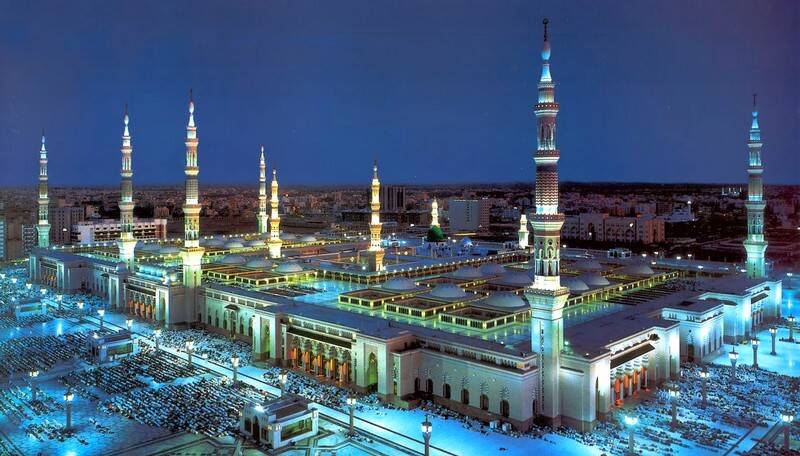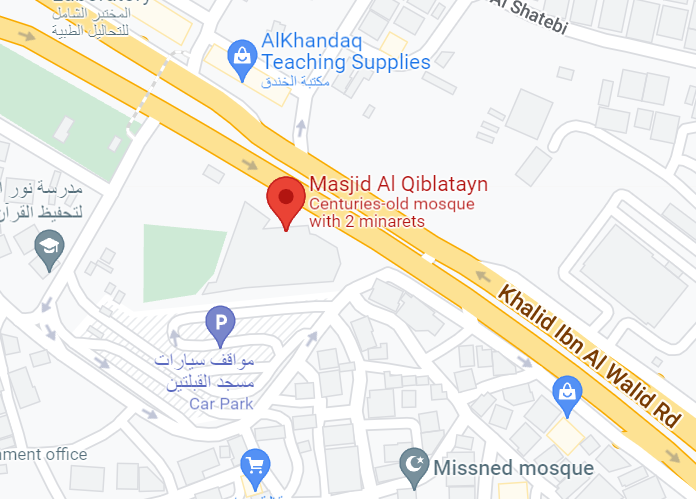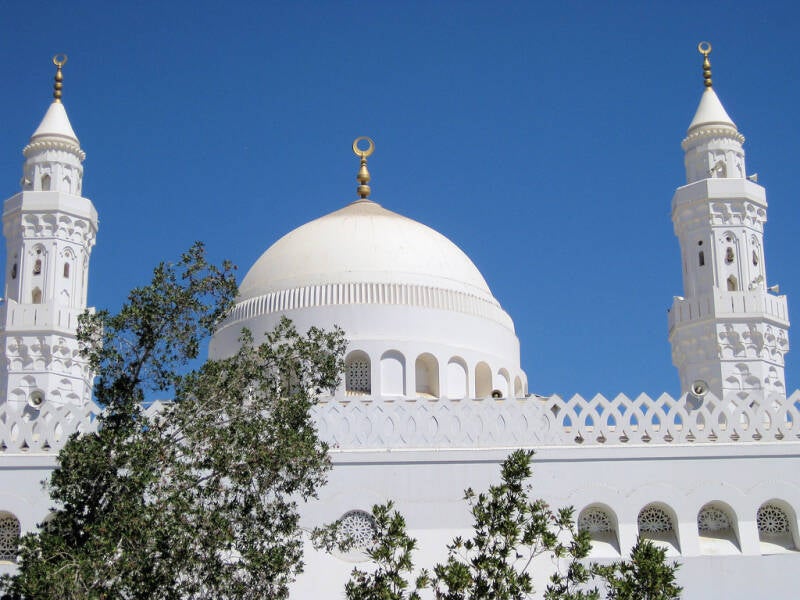Masjid Quba (1AH)
The first Mosque built by Prophet ﷺ
- This was the first mosque that was built when Muslims made Hijra to Madinah. There is additional rewards for praying here (see evidences below)
- The following verse was revealed in relation to this Masjid. Do not ˹O Prophet˺ ever pray in it. Certainly, a mosque founded on righteousness from the first day is more worthy of your prayers. In it are men who love to be purified. And Allah loves those who purify themselves. (9:108)
- Ibn ‘Umar (may Allaah be pleased with him) said: The Prophet (peace and blessings of Allaah be upon him) used to go to the mosque of Quba’ every Saturday, walking or riding. Reported by Al-Bukhaari (1193) and Muslim (1399)
- Narrated from Usayd ibn Zuhayr al-Ansaari, who was one of the companions of the Prophet (peace and blessings of Allaah be upon him), that the Prophet (peace and blessings of Allaah be upon him) said: “Prayer in the mosque of Quba’ is like ‘Umrah.” Classed as saheeh by al-Albaani in Saheeh al-Tirmidhi
Masjid Nabawi (1AH)
How it was Built
- The Prophet ﷺ had asked to purchase the this land from Banu An-Najjar, but they did not want to charge the Prophet ﷺ and gave it for the sake of Allah. There were graves of Polytheists & many trees, the trees were cut and the graves of Polytheist were moved. Narrated 'Urwa bin Az-Zubair: Allah's Messenger (ﷺ) stayed with Bani 'Amr bin 'Auf for ten nights and established the mosque (mosque of Quba) which was founded on piety. Allah's Messenger (ﷺ) prayed in it and then mounted his she-camel and proceeded on, accompanied by the people till his she-camel knelt down at (the place of) the Mosque of Allah's Messenger (ﷺ) at Medina. Some Muslims used to pray there in those days, and that place was a yard for drying dates belonging to Suhail and Sahl, the orphan boys who were under the guardianship of 'Asad bin Zurara. When his she-camel knelt down, Allah's Messenger (ﷺ) said, "This place, Allah willing, will be our abiding place." Allah's Messenger (ﷺ) then called the two boys and told them to suggest a price for that yard so that he might take it as a mosque. The two boys said, "No, but we will give it as a gift, O Allah's Messenger (ﷺ)!" Allah's Messenger (ﷺ) then built a mosque there. The Prophet (ﷺ) himself started carrying unburnt bricks for its building and while doing so, he was saying "This load is better than the load of Khaibar, for it is more pious in the Sight of Allah and purer and better rewardable." He was also saying, "O Allah! The actual reward is the reward in the Hereafter, so bestow Your Mercy on the Ansar and the Emigrants." Thus the Prophet (ﷺ) recited (by way of proverb) the poem of some Muslim poet whose name is unknown to me. [Hadith was summarised from Sahih Bukhari, 3906]
Expansions & Rebuilding
- The first expansion took place after the return from Khaibar, as the number of Muslims increased.
- During the Caliph of Abu Bakr the pillars had decayed so he replaced them. During the Caliph of Umar, the number of Muslims increased, and therefore he rebuilt the Masjid
- It was further expanded by other Caliphs and the present day rulers today.
Prophet ﷺ, Abu Bakr & Umar's grave
- It should be noted that the Prophet's ﷺ house was next to the Masjid, & therefore he was buried in his house. Abu Bakr & Umar were also buried here. It was only during the expansions of the Mosque where the graves had become incorporated with the Masjid. The scholar Shaykh Bin Baz explains this; When al-Waleed ibn ‘Abd al-Malik expanded the Mosque of the Prophet (peace and blessings of Allaah be upon him) at the end of the first century, he incorporated the room into the mosque, but he did wrong thereby, and some of the scholars denounced him for that, but he believed that there was nothing wrong with it for the sake of expanding the mosque. It is not permissible for a Muslim to take that as evidence that mosques may be built over graves, or that people may be buried inside mosques, because that goes against the saheeh ahaadeeth, and because it is a means that may lead to shirk by associating the occupants of the graves in worship with Allaah [Majmoo’ Fataawa al-Shaykh Ibn Baaz, 5/388, 389]
Masjid Qiblatayn (2-3 AH)
- Prophet ﷺ was leading the congregation in Salah in the Asr prayer and during the Salah it was commanded to change Qib'lah, so he turned around Muslims prayed towards Jerusalem for 18 months. Then Qib'lah got changed to Kaaba. Narrated Al-Bara: The Prophet (ﷺ) prayed facing Bait-ulMaqdis (i.e. Jerusalem) for sixteen or seventeen months but he wished that his Qibla would be the Ka`ba (at Mecca). (So Allah Revealed (2.144) and he offered `Asr prayers(in his Mosque facing Ka`ba at Mecca) and some people prayed with him. A man from among those who had prayed with him, went out and passed by some people offering prayer in another mosque, and they were in the state of bowing. He said, "I, (swearing by Allah,) testify that I have prayed with the Prophet (ﷺ) facing Mecca." Hearing that, they turned their faces to the Ka`ba while they were still bowing. Some men had died before the Qibla was changed towards the Ka`ba. They had been killed and we did not know what to say about them (i.e. whether their prayers towards Jerusalem were accepted or not). So Allah revealed:-- "And Allah would never make your faith (i.e. prayer) to be lost (i.e. your prayers offered (towards Jerusalem). Truly Allah is Full of Pity, Most Merciful towards mankind." (2.143)
- We have certainly seen the turning of your face, [O Muhammad], toward the heaven, and We will surely turn you to a qiblah with which you will be pleased. So turn your face [i.e., yourself] toward al-Masjid al-Haram. And wherever you [believers] are, turn your faces [i.e., yourselves] toward it [in prayer]. Indeed, those who have been given the Scripture [i.e., the Jews and the Christians] well know that it is the truth from their Lord. And Allah is not unaware of what they do. [Al-Baqarah 2:144]
Battle of Badr (2AH)
How The Battle Started
- The Prophet ﷺ had learnt about Abu Sufyan's trade caravan which carried Quraysh wealth, he asked the people do you want to go after them? they replied yes. Not everyone went, but around 313-317. When Abu Sufyan learned about the move, he informed the Quraysh via Damdam bin Amr Ghifari.
-
The Quraysh led by Abu Jahl then went in support, lead by around 1300 fighters. Abu Sufyan was able to escape & informed the Quraysh of this. Abu Jahl insisted on going to Badr and camping their for 3 days.
The Muslims Decide On Confrontation
-
The Prophet ﷺ Received news about this march from Allah, some of the believers were not ready for an erupt confrontation : 5) As your Lord caused you (O Muhammad صلى الله عليه وسلم) to go out from your home with the truth; and verily, a party among the believers disliked it, 6) Disputing with you concerning the truth after it was made manifest, as if they were being driven to death, while they were looking (at it). 7) And (remember) when Allah promised you (Muslims) one of the two parties (of the enemy i.e. either the army or the caravan) that it should be yours; you wished that the one not armed (the caravan) should be yours, but Allah willed to justify the truth by His Words and to cut off the roots of the disbelievers (i.e. in the battle of Badr). 8) That He might cause the truth to triumph and bring falsehood to nothing, even though the Mujrimun (disbelievers, polytheists, sinners, criminals) hate it. [Surah Al-Anfal 5-8].
- Abu Bakr, Umar & Miqdad bin Amr on the other hand, were keen on marching towards Badr. They were keen on doing whatever was the right thing. Narrated Ibn Masud: I witnessed Al-Miqdad bin Al-Aswad in a scene which would have been dearer to me than anything had I been the hero of that scene. He (i.e. Al-Miqdad) came to the Prophet (ﷺ) while the Prophet (ﷺ) was urging the Muslims to fight with the pagans. Al-Miqdad said, "We will not say as the People of Moses said: Go you and your Lord and fight you two. (5.27). But we shall fight on your right and on your left and in front of you and behind you." I saw the face of the Prophet (ﷺ) getting bright with happiness, for that saying delighted him. [Bukhari, 3952]
- The Prophet ﷺ asked others for their opinions (specifically the Ansar) & they affirmed their support.
Preparing For Battle
- The Muslims got some information on the Quraysh in terms of the number of fighters etc.. Allah had sent down rain that night to purify the believers "(Remember) when He covered you with a slumber as a security from Him, and He caused water (rain) to descend on you from the sky, to clean you thereby and to remove from you the Rijz (whispering, evil-suggestions) of Shaitan (Satan), and to strengthen your hearts, and make your feet firm thereby" [Surah Al-Anfial, 11]
- Previous nights from the battle, the Prophet ﷺ supplicated a lot, this has been preserved in Sahih Muslim 1763, which us a lengthy hadith. Allah also revealed the following verse in relation to the Prophet's prayers; "(Remember) when you sought help of your Lord and He answered you (saying): "I will help you with a thousand of the angels each behind the other (following one another) in succession." [Surah Al-Anfial, 9]
The Battle Result
- The battle was a big victory for the Muslims, 70 pagan's were killed including Abu Jahl, Umaiyah bin Khalafwas & As bin Hisham bin Mughirah & another 70 were captured.
- 14 were killed from the Muslims.
-
Narrated Abu Talha: On the day of Badr, the Prophet (ﷺ) ordered that the corpses of twenty four leaders of Quraish should be thrown into one of the dirty dry wells of Badr. (It was a habit of the Prophet (ﷺ) that whenever he conquered some people, he used to stay at the battle-field for three nights. So, on the third day of the battle of Badr, he ordered that his she-camel be saddled, then he set out, and his companions followed him saying among themselves." "Definitely he (i.e. the Prophet) is proceeding for some great purpose." When he halted at the edge of the well, he addressed the corpses of the Quraish infidels by their names and their fathers' names, "O so-and-so, son of so-and-so and O so-and-so, son of so-andso! Would it have pleased you if you had obeyed Allah and His Apostle? We have found true what our Lord promised us. Have you too found true what your Lord promised you? "`Umar said, "O Allah's Messenger (ﷺ)! You are speaking to bodies that have no souls!" Allah's Messenger (ﷺ) said, "By Him in Whose Hand Muhammad's soul is, you do not hear, what I say better than they do." (Qatada said, "Allah brought them to life (again) to let them hear him, to reprimand them and slight them and take revenge over them and caused them to feel remorseful and regretful.") [Sahih Bukhari 3976]
Uhud Mountain - Battle of Uhud (3 AH)
- It was the 2nd battle the Muslims fought in, it happened after the battle of Badr. The Sahaba who didn't participate in the battle of Badr were really keen on fighting this one, and suggested to the Prophet ﷺ to attack and not be defensive.
- Some Sahaba's confronted other Sahaba's feeling that they forced the Prophet ﷺ to attack, so these Sahaba's said to the Prophet ﷺ, we will remain with you should you decide to stay here. The Prophet then said "it does not suit a prophet that once he had put on Armor. He should take it off until Allah has decided between him and the enemy" Reported by Bukhari & others
- The Prophet had set archers on the hill, and told them not to move. They ended up moving as they thought it was safe to get the war booty, This lead to the Prophet being severely injured. Stones struck his face, injuring his tooth. He was also attacked on his forehead and he got hurt on his shoulder. And Allah did indeed fulfil His promise to you when you were vanquishing your enemy by His permission until the moment you lost your courage and started to dispute the command [of the Prophet], and you disobeyed after Allah showed you the spoils of war which you love. Among you are some that desire this world and some that desire the Hereafter. Then He made you flee from your enemy, that He might test you. But surely, He forgave you, and Allah is Most Gracious to the believers. [Surah Āli ‘Imrān: 152]
- When a single disaster struck you [on the day of Uhud], though you had struck the enemy [at the battle of Badr] with a victory twice as great, you said, “From where did this disaster come?” Say, “It is from your own selves.” Indeed, Allah is over all things powerful.” (Surah Āli ‘Imrān: 165)
- On the south side are the graves of the martyrs and they're seventy in number
-
The Prophet said "this is a mountain which loves us and we love it" Reported by Bukhari
Battle of Trench/Ditch (The Seven Mosques) (AH 5)
The Battle
- Took place two years after the Battle of Uhud. When the Prophet ﷺ migrated from Makkah to Madinah, there were three Jewish tribes in Madinah: Banu Qaynuqaa‘, Banu an-Nadeer and Banu Qurayzah. The Prophet ﷺ invited them to Islam, but most of them insisted on disbelieving. He drew up a covenant with them (i.e., a binding contract) then they waged war against him.
- The name Ahzab (groups) was given to the battle because along with the Qurayshi polytheists, Jews, Ghatafans and many other Arab tribes and groups came together in order to attack Muslims of Madinah.
- The Quraish had tried to remove Prophet ﷺ from Madinah and this defeat caused them to lose their trade with Syria and much of their prestige with it. At this point, Quraish and other non-believers residents of Makkah began to consider that conversion to Islam would be the most prudent option for them.
-
Narrated Jabir: We were digging (the trench) on the day of (Al-Khandaq ( i.e. Trench )) and we came across a big solid rock. We went to the Prophet (ﷺ) and said, "Here is a rock appearing across the trench." He said, "I am coming down." Then he got up, and a stone was tied to his belly for we had not eaten anything for three days. So the Prophet (ﷺ) took the spade and struck the big solid rock and it became like sand. Reported in Sahih al-Bukhari 410
Khaybar Expedition (7AH)
- The Jews of Khaybar had enmity towards Islam. The Prophet ﷺ organised an expedition to finish off their leaders.
- In total it took 10 days to capture the different forts. The Jew's lost around 93 people and around 15-20 Muslims died.
-
Narrated Humaid: Anas bin Malik said, "Whenever the Prophet (ﷺ) went out with us to fight (in Allah's cause) against any nation, he never allowed us to attack till morning and he would wait and see: if he heard Adhan he would postpone the attack and if he did not hear Adhan he would attack them." Anas added, "We reached Khaibar at night and in the morning when he did not hear the Adhan for the prayer, he (the Prophet ) rode and I rode behind Abi Talha and my foot was touching that of the Prophet. The inhabitants of Khaibar came out with their baskets and spades and when they saw the Prophet (ﷺ) they shouted 'Muhammad! By Allah, Muhammad and his army.' When Allah's Messenger (ﷺ) saw them, he said, "Allahu-Akbar! Allahu-Akbar! Khaibar is ruined. Whenever we approach a (hostile) nation (to fight), then evil will be the morning of those who have been warned." [Bukhari 610]
- After the battle, the Jews made an attempt to kill the Prophet ﷺ by sending him a roasted sheep with poison. Finally a peace treaty with the Jews was made.
Baqi Cemetery






















